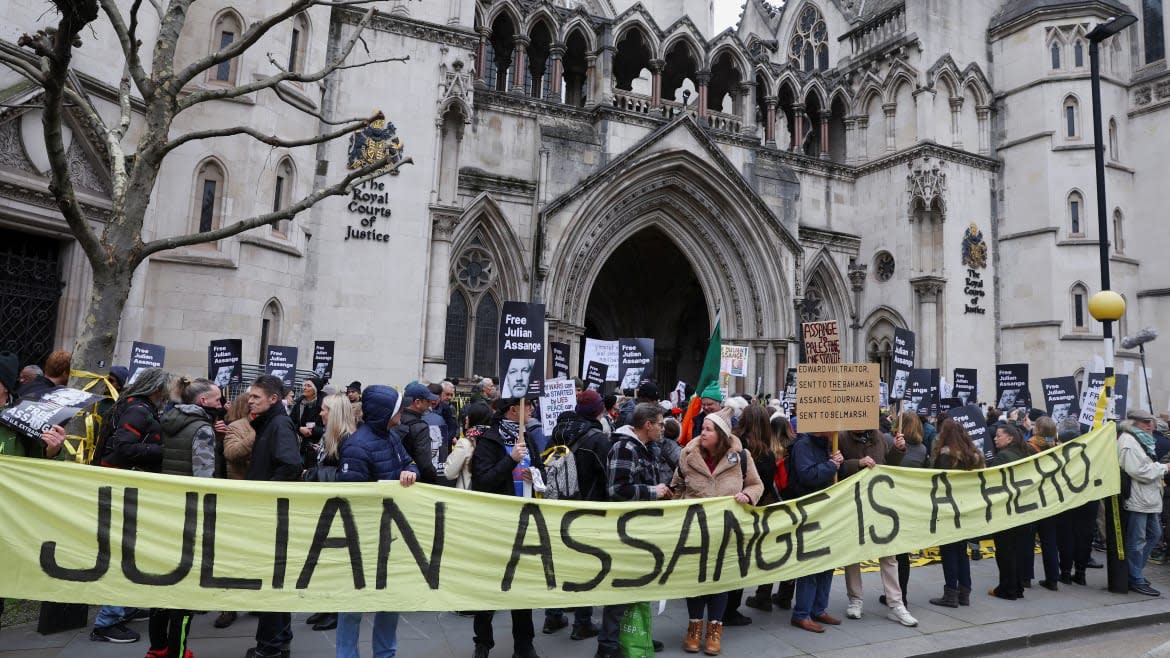WikiLeaks Founder Julian Assange Too Sick to Attend Extradition Hearing

- Oops!Something went wrong.Please try again later.
WikiLeaks founder Julian Assange on Tuesday did not attend the opening of what may be his final U.K. legal effort to stop his extradition to the U.S. to face spying charges, with his lawyer saying he was unable to attend for health reasons.
The two-day hearing at London’s High Court is set to determine if Assange, 52, can be granted a new appeal hearing against a 2022 decision by the British government that he can be lawfully extradited to the U.S. to answer 18 criminal charges. American prosecutors claim Assange illegally helped former U.S. Army intelligence analyst Chelsea Manning to steal diplomatic cables and military files that were published by WikiLeaks, allegedly putting lives in danger.
Chelsea Manning Is Putting the Pieces Back Together
Assange has been fighting against extradition to the U.S. for over a decade. He spent seven years living in the Ecuadorian Embassy in London before his arrest in April 2019. He’s been held in Belmarsh Prison—a high-security facility on the outskirts of the English capital—ever since.
Judge Victoria Sharp noted in court Tuesday that Assange’s request to attend the proceedings had been granted. His lawyer Ed Fitzgerald thanked the court but said his client was unwell, though he did not elaborate on the nature of the illness.
Fitzgerald argued that there is a possibility that Assange “will suffer a flagrant denial of justice” if his extradition goes ahead. “He is being prosecuted for engaging in ordinary journalistic practice of obtaining and publishing classified information, information that is both true and of obvious and important public interest,” Fitzgerald added.
Assange’s attorneys claim that he could face 175 years in prison if convicted in the U.S., though American prosecutors say his hypothetical sentence would likely be significantly shorter. Fitzgerald also argued that no consideration has yet been given to a reported CIA plot to kidnap or murder Assange during his time holed up in the embassy.
“We don’t know what to expect, but you’re here because the world is watching,” Assange’s wife, Stella, told crowds of his supporters who assembled outside the court Tuesday. “They just cannot get away with this. Julian needs his freedom and we all need the truth.” Last week, she said that his health had declined in recent years and that “if he’s extradited, he will die.”
Assange’s brother, Gabriel Shipton, told Britain’s TalkTV on Tuesday morning that his sibling is “going through an immense amount of suffering” in prison. “He’s deteriorating,” Shipton said. “His health is in a very delicate position.”
Fitzgerald claims Assange is being targeted for political crimes given that he was charged under the U.S. Espionage Act and that allowing him to be sent to America would violate Britain and the U.S.’ extradition treaty. If the ruling goes against Assange, his attorneys can seek an emergency injunction from the European Court of Human Rights, though Assange allies fear he could already be put on a flight across the Atlantic before that can happen, given the U.K. government has already signed an extradition order.
WikiLeaks disclosures shed light on U.S. actions in Iraq and Afghanistan. The website also published a video of a 2007 incident in which Apache helicopters killed a dozen people—including two Reuters journalists—in Baghdad.
Get the Daily Beast's biggest scoops and scandals delivered right to your inbox. Sign up now.
Stay informed and gain unlimited access to the Daily Beast's unmatched reporting. Subscribe now.

